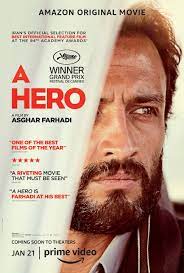A HERO
Iran, 2021, 126 minutes, Colour.
Amir Jadidi, Mohsen Talabandeh, Sahar Goldust.
Directed by Asghard Fahradi.
 With Oscar-winning writer-director, Asgard Farhadi’s previous films, A Separation is not quite a separation, The Past is not exactly the past, and The Salesman has echoes of Arthur Miller’s Death of a Salesman. So, what are we to expect from this very plain title, A Hero or a hero?
With Oscar-winning writer-director, Asgard Farhadi’s previous films, A Separation is not quite a separation, The Past is not exactly the past, and The Salesman has echoes of Arthur Miller’s Death of a Salesman. So, what are we to expect from this very plain title, A Hero or a hero?
The ordinary audience is invited into the atmosphere of an Iranian city, not exactly the atmosphere that media headline suggests, not the world of nuclear developments and sanctions. Rather, this is a small story, a local story of a man on leave from prison, sentenced because of his not paying back a debt to his partner.
The director is very shrewd in his casting. Rahim, played by Amir Jadidi, has a genial smile almost all the time, quiet, seemingly sensible, hard done by in his setting up his company and its failing, enduring prison. Whether he is a hero or not, everyone, the audience included, is charmed by his smile.
Well, not quite everyone. His partner is a bitter man, hostile to Rahim, trying to put him down at every turn, especially to the police and investigators. His antagonism also antagonises the audience.
However, Rahim is estranged from his wife, his sister and her sympathetic builder husband, are looking after his little son who has a speech impediment. Rahim has met a woman in prison and hopes to marry her – though her family are quite hostile to him.
The heroism concerns a purse with gold coins in it, Rahim reporting this to the bank, a distraught woman coming to claim the coins, the prison authorities proud of him and his generous gesture, and the media having more than a field day. He has become not a hero, but the hero, everybody recognising him.
But, as has been said with Fahradi and his films, A Hero is straightforward title is far more ambiguous, and this is the case here, following up the investigation of the finding of the coins, his collaboration with the woman from prison, the effect on his antagonist, the effect on his family, especially his son. The hero becomes more desperate.
While this is an Iranian story, it is also universal story – and has universal interest and appeal. Co-winner of the Cannes Jury Prize, 2021. And a strong reminder of how good uranium films have been for many decades.
- The work of the Director, Oscar awards, multi-awards?
- The titles of his films, simple, yet ambiguous?
- The Iranian setting, the city, the vastness of the archaeological work, homes, interiors, prisons, the streets, ordinary life? The prison, offices? Police precincts, the bank? The musical score?
- The title, the introduction to Rahim, smiling, genial, gentle in manner, seeking out his brother-in-law, for work, financial support, his leave from prison? The background to his case, setting up the company, failing, in debt, the anger of his creditor? The creditors daughter? His going home, the relationship with his sister, his ex-wife, his son and the speech impediment? His visit for several days?
- His background in prison, the prison officials, their attitude towards him, supportive? His meeting the woman in prison, the relationship with her? Meetings? Her family, hostile towards Rahim? The issue of the gold coins, the purse? The attempt to pawn the coins, the calculator not working, the pencil not working, not selling the coins?
- Rahim, the plan with the coins, the woman not wanting to go to the bank, his tentative approach, the questions, statement about finding the coins at the bus stop? Printing and distributing the posters?
- The phone call from the woman, her visit, distraught, the story of the coins, verification, the taxi driver, Rahim’s sister, his son? The gift of the money to the boy? Later tracking down the woman, the taxi driver and his help? Identification of the woman?
- The difficulties with the creditor, the support from the prison authorities for the payment, the creditor refusing, denouncing Rahim?
- The media, the interviews, the television station, everybody recognising Rahim, his modest response?
- The inconsistencies of the story, the woman, going to the police, verifying the story? The creditor and his daughter, continued hostility, denunciation? The effect on his sister, brother-in-law and his continued help, dismay? His son, witnessing?
- The complexities for the prison authorities, publicity, the media?
- The resolution of the story, Rahim and the family, his son, the creditor, the woman friend, returning to prison?
- The complexities and ironies of the title?